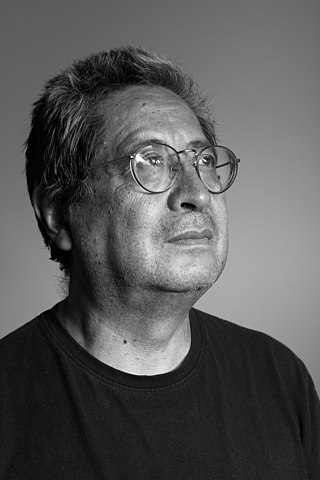Related Research Articles
David C. Johnson was an American composer, flautist, and performer of live electronic music.

Darmstädter Ferienkurse is a regular summer event of contemporary classical music in Darmstadt, Hesse, Germany. It was founded in 1946, under the name "Ferienkurse für Internationale Neue Musik Darmstadt", as a gathering with lectures and concerts over several summer weeks. Composers, performers, theorists and philosophers of contemporary music met first annually until 1970, and then biennially. The event was organised by the Kranichsteiner Musikinstitut, which was renamed Internationales Musikinstitut Darmstadt (IMD). It is regarded as a leading international forum of contemporary and experimental music with a focus on composition. The festival awards the Kranichsteiner Musikpreis for performers and young composers.

Darmstadt School refers to a group of composers who were associated with the Darmstadt International Summer Courses for New Music from the early 1950s to the early 1960s in Darmstadt, Germany, and who shared some aesthetic attitudes. Initially, this included only Pierre Boulez, Bruno Maderna, Luigi Nono, and Karlheinz Stockhausen, but others came to be added, in various ways. The term does not refer to an educational institution.
Emmanuel Nunes was a Portuguese composer who lived and worked in Paris from 1964.
Junsang Bahk is a celebrated Korean composer, also active in Austria.

Mesías Maiguashca is an Ecuadorian composer and an advocate of Neue Musik, especially electroacoustic music.
Gérard Masson is a French composer.
André Laporte is a Belgian composer.
Intuitive music is a form of musical improvisation based on instant creation in which fixed principles or rules may or may not have been given. It is a type of process music where instead of a traditional music score, verbal or graphic instructions and ideas are provided to the performers. The concept was introduced in 1968 by the German composer Karlheinz Stockhausen, with specific reference to the collections of text-notated compositions Aus den sieben Tagen (1968) and Für kommende Zeiten (1968–70). The first public performance of intuitive-music text compositions, however, was in the collective work Musik für ein Haus, developed in Stockhausen's 1968 Darmstadt lectures and performed on 1 September 1968, several months before the first realisations of any of the pieces from Aus den sieben Tagen.
Costin Miereanu is a French composer and musicologist of Romanian birth.
Gonzalo de Olavide y Casenave was a Spanish composer born in Madrid.
York Höller is a German composer and professor of composition at the Hochschule für Musik Köln.
Avo Sõmer is an American musicologist, music theorist, and composer, of Estonian birth.

Jennifer Walshe is an Irish composer, vocalist and artist.
John McGuire is an American composer, pianist, organist, and music editor.
Carré (Square) for four orchestras and four choirs (1959–60) is a composition by the German composer Karlheinz Stockhausen, and is Work Number 10 in the composer's catalog of works.

Fresco is an orchestral composition written in 1969 by the German composer Karlheinz Stockhausen as foyer music for an evening-long retrospective programme of his music presented simultaneously in three auditoriums of the Beethovenhalle in Bonn. It is Nr. 29 in his catalogue of works, and a performance takes about five hours.
Thomas H. Wells is an American composer, pianist, organist, and arts-organization administrator.

Ensemble is a group-composition project devised by Karlheinz Stockhausen for the 1967 Darmstädter Ferienkurse. Twelve composers and twelve instrumentalists participated, and the resulting performance lasted four hours. It is not assigned a work number in Stockhausen's catalogue of works.

Musik für ein Haus is a group-composition project devised by Karlheinz Stockhausen for the 1968 Darmstädter Ferienkurse. Fourteen composers and twelve instrumentalists participated, with the resulting performance lasting four hours. It was not regarded by Stockhausen as a composition belonging solely to himself, and therefore was not assigned a number in his catalog of works.
References
- 1 2 Visscher 2001.
- ↑ Ritzel (1970), pp. 13, 60–61.
- ↑ Iddon 2004, p. 89.